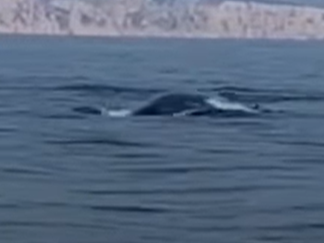Coronavirus: Rare fin whales swim close to Marseille as lockdown curbs human activity
‘The lockdown is helping nature and biodiversity rediscover their natural spaces,’ says park chief

The world’s second-largest mammal took advantage of the absence of human bustle and noise around major city to make a “very rare” appearance.
Two fin whales were spotted near Marseille, southern France, which, like almost all of Europe, is in lockdown during the coronavirus crisis.
A sea patrol filmed the pair powering through the waters off the Calanques national park, a protected reserve of outstanding natural beauty.
Didier Reault, president of the park board, said it was “very, very rare” for fin whales to be spotted and filmed at such close quarters in the reserve’s waters.
The whales usually stay further out in deeper Mediterranean seas but seem to have been drawn in by the halt in maritime traffic, water sports, fishing and pleasure craft, Mr Reault said.
“The absence of human activity means the whales are far more serene, calm, and confident about rediscovering their playground that they abandon when there is maritime transport activity,” he said.
“It is clear that the lockdown of humans is helping nature and biodiversity rediscover their natural spaces.”
The fin whale, the second-largest mammal in the world, after the blue whale, weighs up to 70 tons and grows at least 65ft long. It has a distinct ridge along its back behind the dorsal fin, which gives it the nickname “razorback”.
Wild animals have ventured into other places vacated by humans, too. In Llandudno, north Wales, mountain goats have roamed through the streets.
Mr Reault said he hoped people would emerge from lockdowns with greater appreciation for biodiversity, being “a bit more respectful of the tranquillity and serenity of animals”.
“We should tell ourselves that if we want to keep seeing [nature], we must know how to respect it,” he said.
Join our commenting forum
Join thought-provoking conversations, follow other Independent readers and see their replies
Comments
Bookmark popover
Removed from bookmarks